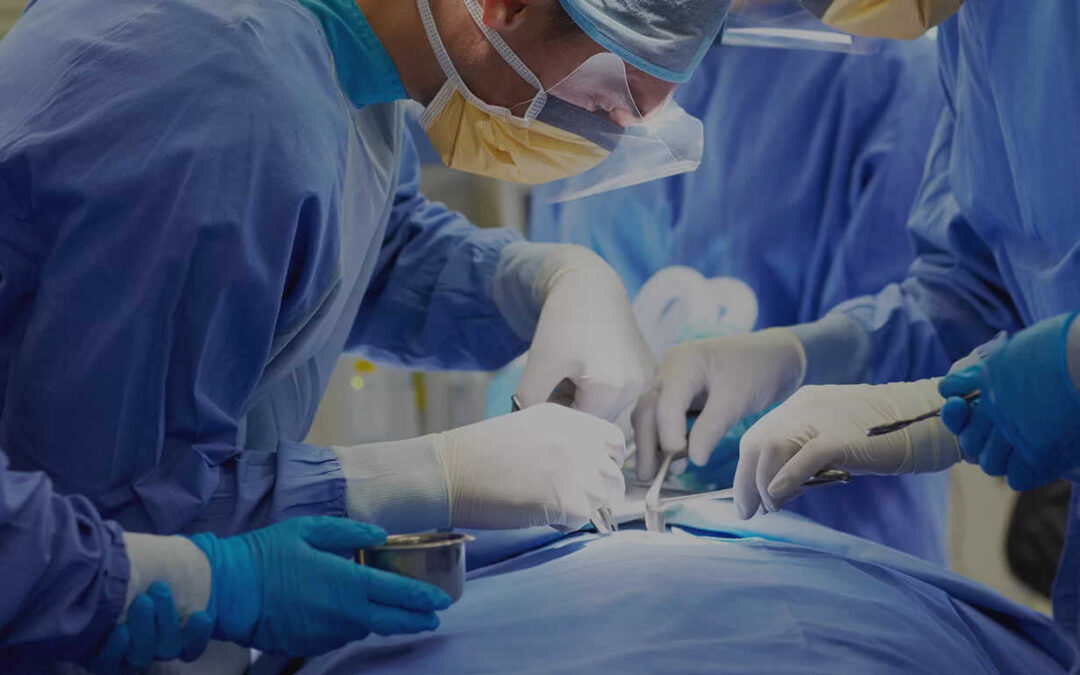Hernia Repair Surgery in Houston at Surgical Associates of Southern Texas
Dr. Shakir, Houston Hernia Repair Specialist, is now available for consultation for hernia(open, laparoscopic, or robotic hernia repair) surgery at our Katy and Sugar Land Centers) at Surgical Associates of Southern Texas’ clinics. The clinics are conveniently located in the central areas of Greater Houston, particularly in Katy and Sugar Land. Our primary objective is to offer high-quality surgical care, prioritizing minimally invasive procedures to ensure a swift recovery, enabling you to return to your life as quickly as possible.
Cutting edge Robotic Surgical procedures facilitate smoother recovery, earlier return to work, and minimizing pain. Serving the Greater Houston area, our Physician holds double board certification in Surgical Oncology and General Surgery. We warmly welcome new patients, both local and from overseas.
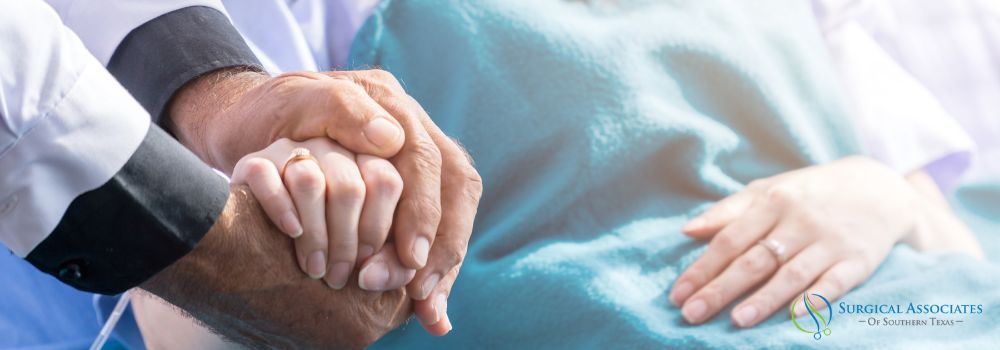
What is a Hernia?
A hernia usually occurs in the abdomen or groin when one of the organs pushes through the muscle or tissue that contains it. It can look like a bulge that changes in size or come and go with different positions and activities. Hernias may or may not cause symptoms like discomfort or pain.
Hernias can occur because of an injury, previous surgery, or birth disorder.
Hernia Specialist in Greater Houston
If the hernia is severe and requires surgical intervention, we at Surgical Associates of Southern Texas attempt to make the hernia repair treatment minimally invasive to help speed recovery and limit the pain caused. We are located at 410 W Grand Pkwy S Suite 4D, Katy, TX 77494, and we serve the greater Houston area for hernia repair surgery. Please feel free to call 713-955-9191 for a consultation.
There are several techniques for hernia repair surgery, including open and laparoscopic surgery. Robotic hernia repair is a newer technique that uses a surgical robot to perform the surgery. The choice between traditional hernia repair surgery and robotic hernia repair will depend on the patient’s individual needs and the surgeon’s recommendation. It’s important to discuss the benefits and risks of each option with our hernia surgeon specialist to make an informed decision.
Recovery time after hernia surgery
The type of Hernia you have can affect the complexity of the surgery and the likelihood of complications. Inguinal hernias are the most commonly occurring type and generally have a lower risk of complications than other types of hernias.
Recovery time after hernia surgery depends on the type of surgery you undergo. Laparoscopic or robotic hernia surgeries are less invasive and may allow quicker recovery than open surgery.
Age can also be a factor in the recovery process, as younger patients tend to heal more quickly than older patients. Additionally, overall health can play a role, with relatively healthy patients often experiencing a faster recovery than those with preexisting health conditions.
The experience level of your hernia surgeon can also be a significant factor in your recovery. Research has shown that hernia surgery with an experienced surgeon can lower your risk of complications and improve your overall outcome. Researching and choosing a qualified surgeon with a proven track record for performing hernia surgeries is essential.
What Are The Types of Hernias?
Specific types of common abdominal and groin hernias include:
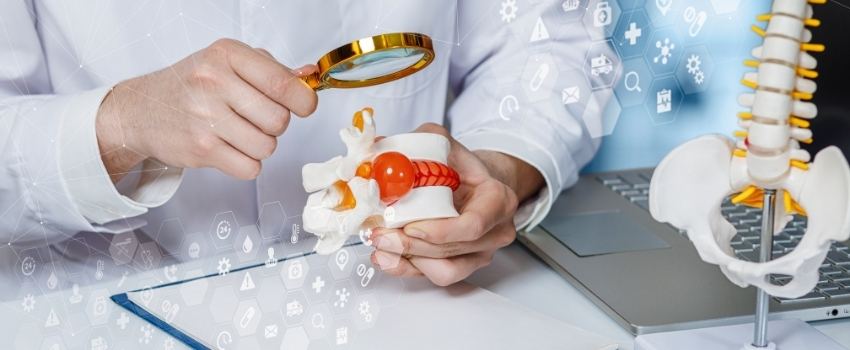
Cost For Hernia Surgery
The cost of your hernia surgery in Houston is variable depending on patients’ specific insurance plans and the facility where the surgery is performed. Dr. Shakir performs this surgery at various hospitals and outpatient surgery centers to bring the cost down to the minimum for the patient.
We are also in network with all major insurance plans, and patients who do not have insurance are also given special self-pay rates. At Surgical Associates of Southern Texas, we believe in providing care to everyone, regardless of socioeconomic status, and keeping the surgery cost in mind.
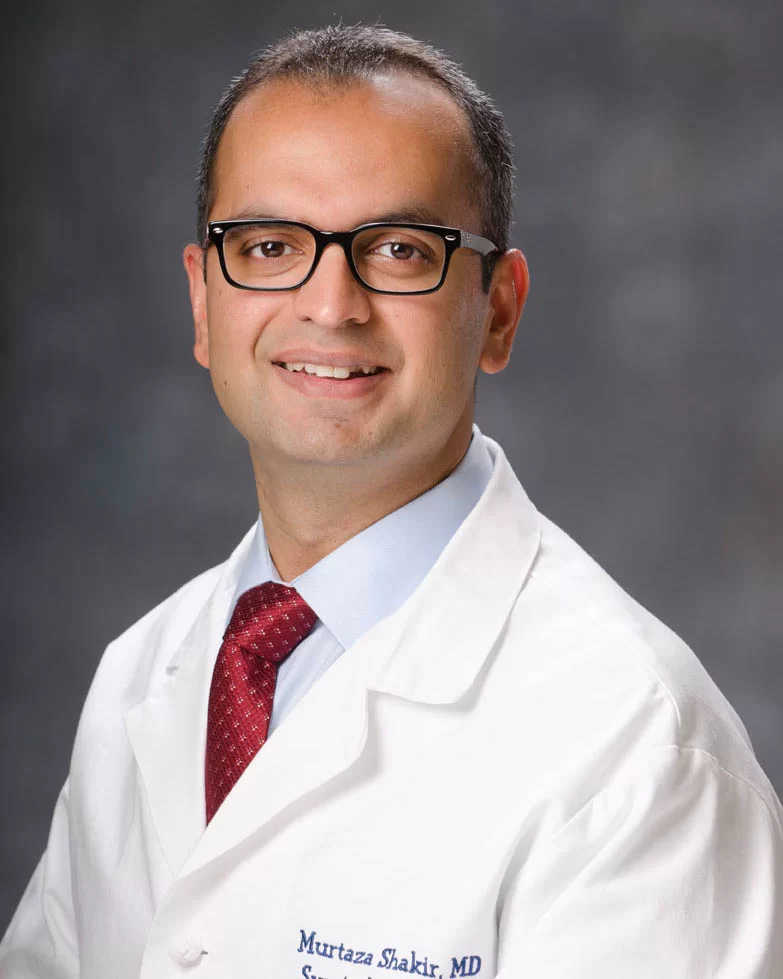
Dr. Murtaza Shakir has been ranked as one of the top doctors of General surgery in Houston, as per Houstonia
Houstonia
Our Surgeon
Board-certified General Surgeon and Surgical Oncologist
Dr. Shakir is a board-certified General Surgeon and Surgical Oncologist working in Katy and SUGAR LAND. After graduating from Medical School at Aga Khan University in Karachi, Pakistan, he ventured to complete his residency in General Surgery at the Riverside Methodist Hospital in Columbus, Ohio. He also specializes in providing the most cutting edge and personalized treatment for patients with Breast Cancer.
Specialized Surgeron
As a general surgeon, he provides expert treatment of common general surgical problems like Gallbladder Surgery, Hernia Repair, and complex abdominal wall reconstruction.
General Surgeon & Surgical Oncologist
Being the only Board Certified Surgical Oncologist outside of the Texas Medical Center, Dr. Shakir specializes in treatment of various Malignancies ranging from Colon, Rectal, Liver and Pancreatic cancer
Need Consultation!
713-955-9191
Hernia- General Information Only
A hernia is most commonly found between our chest and hips. Hernias are common, affecting 15 out of every 1,000 in the United States. In the United States, approximately 700,000 hernia repairs are performed each year. Mass Researchers have examined why some people develop hernias while others do not. Both genetic factors (mostly related to collagen, one of our muscles’ structural proteins) and acquired factors (such as infection or obesity) play a role.
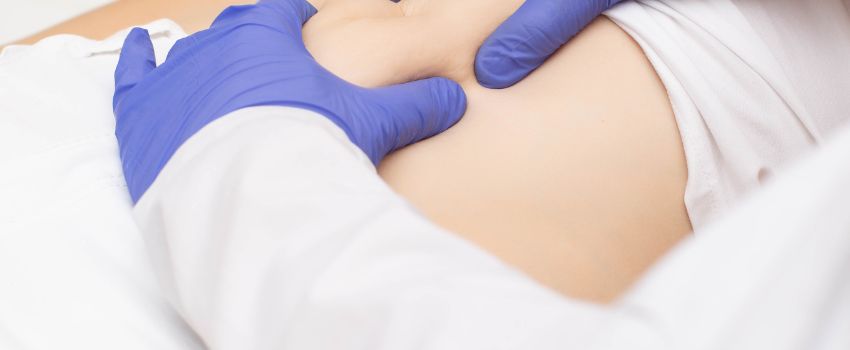
More About Hernia
When an organ pushes through a hole in the muscle or tissue that holds it in place, it causes a hernia. There are few symptoms in many cases, though we may notice a swelling or lump in the tummy (abdomen) or groin. This peritoneal defect allows organs and tissues to push through or herniate, resulting in a bulge. Inguinal hernias, femoral hernias, umbilical hernias, and hiatal hernias are some of the different types of hernias that can occur. Hernias can be dangerous in addition to affecting quality of life. When a section of the intestine is strangled inside a tight hernia, it may be cut off from an adequate blood supply and die. It is critical to treat a hernia as soon as possible.
Variety of Hernias Shapes and Sizes
Hernias come in a variety of shapes and sizes. We’ll look at some of the most common ones here.
Inguinal hernias
An inguinal hernia emerges when tissue protrudes through a weak spot in the abdominal muscles, such as part of the intestine. They are visible as a groin bulge. Groin hernias, more common in men than women, can grow large, descend towards the testicles, and distort the testicular sac. An inguinal hernia is not always dangerous.
However, it does not improve independently and can lead to life-threatening complications. Most groin hernias are repaired with a long-lasting, tension-free mesh insert. Non-mesh repairs, on the other hand, are an option and can be performed under local or general anesthesia, depending on the patient’s condition and preference.
Umbilical hernias
An umbilical hernia occurs when a portion of our intestine bulges through a hole in our abdominal muscles near our belly button. This type of Hernia can develop in babies if the opening in the belly through which the umbilical cord moves fails to seal properly after birth. A soft swelling or bulge near the navel is caused by an umbilical hernia. The bulge in a baby with an umbilical hernia may be visible only when they cry, cough, or strain. Children’s umbilical hernias are usually painless. Umbilical hernias that develop in adulthood can cause abdominal pain.
Femoral hernias
A femoral hernia is a relatively uncommon type of Hernia. Femoral hernias can emerge as a painful lump in the internal upper thigh or groin. The lump is often pushed back in or disappears when we lie down. The lump may appear as a result of coughing or straining. Femoral hernias are more common in women than in men. Femoral hernias are uncommon in the general population. The majority of groin hernias are inguinal, and only about 3% of all hernias are femoral. The majority of femoral hernias do not cause signs and symptoms. Femoral hernias can be healed surgically by pushing the bulge back into position and strengthening the belly wall frailty.
Hiatus hernias
A hiatus hernia, also known as a hiatal hernia, occurs when part of the stomach pushes up into the chest through a hole in the diaphragm. A hiatus hernia occurs when a portion of the stomach protrudes into the chest. It’s prevalent in people over the age of 50. It usually does not require treatment if it is not causing any issues. What tends to cause hiatus hernia is unknown, but it could be due to the diaphragm weakening with age or abdominal stress. The preferred treatment options are lifestyle changes and medication. Surgery is generally advised only as a substitute for long-term medication or when other treatment options have failed.
What exactly causes a hernia?
All hernias ultimately result from a combination of pressure and a muscle or fascia opening or weakness; the pressure pushes an organ or tissue through the opening or weak spot. Muscle weakness can happen at birth but is more common later in life.
Umbilical hernias can develop during pregnancy when the umbilical cord passes through an opening in the abdominal muscles of an infant. Usually, the opening closes shortly after a baby is born. An umbilical hernia can occur at birth or later in life if the muscles in the middle of the abdominal wall do not fully join. Obesity, multiple pregnancies, and previous abdominal surgery can all cause excessive abdominal pressure in adults, leading to umbilical hernias.
Weakened muscles, aging, or repetitive strain on the abdominal and groin areas can all lead to inguinal and femoral hernias. Regular exercise, lifting heavy objects, obesity, repeated coughing, or bowel problems can all contribute to this strain.
What are the signs and symptoms of a hernia?
When lying down, a hernia in the abdomen or groyne can cause a visible lump or bulge that can be pushed back in or disappear. Laughing, crying, coughing, straining throughout a bowel movement, or engaging in physical activity may cause the lump to pop back up after it has been pressed into the colon. Other signs of a hernia include:
- Swelling or bulging in the groyne or scrotum
- Elevated pain at the bulge site.
- discomfort while lifting.
- The size of the bulge grows larger over time.
- A dull, aching feeling.
- A feeling of fullness or signs of bowel obstruction
- There are no bulges on the outside of the body in the case of hiatal hernias.
Hernias do not always cause symptoms. We may not realise we have a hernia until it is discovered during a medical exam for an unrelated issue or a routine physical.
Diagnosis of Hernia
Hernias rarely heal independently, and surgery may be the only way to repair them. The physician may want to monitor the Hernia for any complications. This method is known as watchful waiting.
Wearing a truss may help to alleviate hernia symptoms in some cases. A truss is a supportive undergarment that aids in retaining the Hernia. Before using a truss, always consult with the doctor to ensure that it fits properly. Hernia surgery can be performed in one of three ways:
The doctor may also advise getting an MRI scan, especially if anyone has pain that worsens when they exercise. In the early stages, sports can cause a hernia with no visible bulge, but an MRI can detect a tear in the abdominal muscles. If the patient is a woman in her childbearing years, the doctor may recommend an ultrasound to rule out other pelvic conditions that can cause abdominal pain.
Hernia Repair Surgery
Hernias rarely heal on their own, and surgery may be the only way to repair them. The physician may simply want to keep an eye on the hernia for any complications. This method is known as watchful waiting.
Wearing a truss may help to alleviate hernia symptoms in some cases. A truss is a supportive undergarment that aids in the retention of the hernia. Before using a truss, always consult with the doctor to ensure that it fits properly. Hernia surgery can be performed in one of three ways:
Open surgery
An incision or cut in the groyne is made for open hernia repair. The bulging intestine is identified in the hernia “sac.” The hernia is then pushed back into the abdomen and the abdominal wall is strengthened with stitches or synthetic mesh. Most patients can go home a few hours after surgery and will be fine in a few days.
Laparoscopic surgery
The same types of repairs are performed during laparoscopic surgery. Instead of a cut to the outside of the abdomen or groyne, tiny incisions are made to allow surgical tools to be inserted to complete the procedure.
Robotic Surgery for Hernia Rapair
Robotic surgery is a newer technique for hernia repair in which the surgeon sits at a console and controls the surgical instruments from the console. In the operating room, the surgeon sits at a console and operates the surgical instruments from there. While robotic surgery can be used to repair minor hernias, it cannot be used to reconstruct the abdominal wall.
What can happen if we don’t treat a hernia?
Hernias, with the exception of umbilical hernias in babies, do not go away on their own. A hernia can become larger and more painful over time or develop complications.
Untreated inguinal or femoral hernias can lead to many complications. Part of the intestine will become stuck in the inguinal canal, causing nausea, throwing up, stomach problems, and a painful lump in the groin. Strangulation occurs when a portion of the intestine is trapped so that its blood supply is cut off. In such cases, immediate surgery is required to prevent tissue death within hours of occurrence.
Need Consultation With Hernia Repair Specialist in Houston!
For more information on our procedures or if you are interested in scheduling an appointment, please reach us at our Katy or Sugar Land location, or contact Dr. Shakir, a board-certified General Surgeon and Surgical Oncologist, directly. Dr. Sakir can let you know if you are a good candidate for the procedure and can recommend any additional treatments that can help you reach your goals.
However, mentioned below our Katy, TX clinic address when looking for hernia repair near Katy, Fulshear, Richmond:
410 W Grand Pkwy S,
Suite 4D, Katy, TX 77494.
Patients looking for competent surgeon near me for Hernia repair from Sugar Land, TX, Stafford, Fort Bend or Greater Houston areas, can visit our below clinic location
17510 W Grand Pkwy S Ste 460
Sugar Land, TX 77479.

What Are The Common Causes Of Hernias?
- Lifestyle and other demographic factors
- Pregnancy or being overweight/obese
- Severe chronic coughing
- Constipation/straining bowel movements
- Strenuous exercise
- Heavy weight lifting
Testimonials
How Clients Review Our Service..
Our Blogs: General Information

Breast Cancer Symptoms and Treatment
The journey through cancer diagnosis, treatment, and recovery is undoubtedly challenging. Breast cancer is one of the leading health concerns for women worldwide. Its earliest understanding can be...
Making the most of surgical outputs
Having one-on-one interaction with our experienced surgeon helps with understanding the disease process and surgical procedure well. Whether it is for general surgery or surgical oncology, we always do our best to ensure the best possible surgical outcomes for both local and overseas patients.
Accepting Patients From Greater Houston, Katy, Sugar Land, Richmond, Fulshear Areas.
Patients visiting from the greater Houston and other areas of Texas are requested to call us for a confirming appointment. Overseas patients request us to contact us in advance for a detailed consultation.
Get Directions…….

